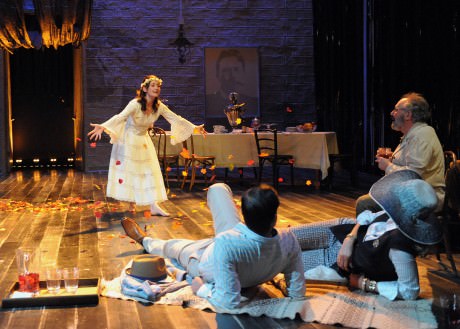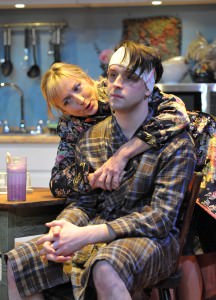Life is what you make of it; happy or miserable, good or bad, it doesn’t matter because life just goes on and on and on. Human beings are flawed. They have needs.They want more. It’s true of all of us as we blunder along down the road of life, ever searching for the ultimate answer to the great question: Why? And we may never find it, but it’s that question that we often find propelling us forward through our daily grind, and such a question finds a poignant exploration in the Woolly Mammoth Theatre Company’s world premier of Aaron Posner’s Stupid Fucking Bird.

Directed by Howard Shalwitz, this play is loosely adapted from Anton Chekhov’s The Seagull. With eerie haunting echoes of the original work in a much faster and more modern approach to the age old question – this play pushes the boundaries of what makes an audience comfortable, what makes an audience thing, what makes human beings be, and act and do. A stunning and provocative new piece of theatre well worth seeing.
The brilliantly inspired atmosphere is enhanced tenfold with Set Designer Misha Kachman’s ideas in play. An enormous ink printing of Chekhov against the back wall with smaller ink printing in varying shades flanking either side gives the audience the ever present notion of the father of this work watching over it. The constant watching eyes of Chekhov’s likeness is an intimidating factor that plays well into the theme of the performance as young Con feels his work is always being judged, and since his work in fact is this work that is based on Chekhov’s work it seems only fitting that the eyes of the master look down to make that call. Kachman does an impressive job cultivating a modern feel for the tightly enclosed interior space of the kitchen in act II, her clever nod to the reality of the play popping up in the alphabet magnets on the fridge that spell out the word ‘actually.’
Playwright Aaron Posner creates an enigmatic, esoteric work that delves deep into the existential pool of the human existence, mirroring formats, character constructs and themes from Chekhov’s original work in this highly engaging and confrontational new concept. Posner doesn’t only focus on the concept of life and its purpose but also seamlessly entwining the jumble of love or what passes as love to some people into the mix of comic and dramatic events of this production. What really makes this show stand out is the complete dissolve of the fourth wall throughout the performance. That extra edge of having the characters interacting with the audience, despite knowing and announcing that they are fictional, really brings the subject matter fully into your face making you confront the conflicts that these characters are struggling through with a brazen raw realness.
Posner has a knack for crafting natural comedy into the dramatic moments of the production as well as stabbing serious plot altering moments into the more lighthearted scenes. The emotions of the production are constantly rolling about, like stones in a rock tumbler, never quite settling into total comedy or drama, happiness or misery; an unsettling notion of continual emotional existence that doesn’t make you uncomfortable but keeps you from ever actually getting comfortable. The work overall provides a perpetual state of sub-existence, characters that in actuality are human beings just like everyone of us, trying to eke out their purpose, find happiness and simply be. Posner’s characters are deeply complex but highly relatable to the everyman as there is something rewardingly identifiable in each of them; be it wanting fame, wanting to be loved, wanting to love, or simply wanting to feel.
Director Howard Shalwitz centers the focal energy of the production into the ensemble in true Chekov style. These seven performers come together as one pulsing ensemble that drives the momentum of the production. Not a moment feels ill-placed or out of synch with the movement of the performance. Each of the performers takes a turn falling into the focal spotlight of the production, blazing a leading moment of emotional upheaval before plunging themselves back into the collective. Shalwitz frames relationships within the production through tight blocking and subtle physical intimacies, adding another complex layer to this richly rewarding production.
The play is populated with intense moments of conflict and unique staging techniques utilized to deliver acute moments of important subtext. Act II involves a scenic set up in the upper and lower balconies of the house with tight focal spotlights on the performers as they speak in unison as men and women to express their feelings of need, want, and desperation; a truly stunning visual and aural experience. Music also becomes a vessel of emotive expressions, particularly for Mash (Kimberly Gilbert). Lyrically dissonant at times, her musical interludes, accompanied by her skillful strumming of a ukulele type instrument, speak volumes to her progression of thought in regards to her meaning and place in life.
Gilbert has a raw voice for singing, giving her songs an earthy and soulful feel to them, a fusion of acoustic bluegrass and blues all focused around her melancholic and depressive mood. Gilbert’s character shows the most progressive growth, eventually shedding her disturbed demeanor in favor for a more positive outlook. It’s Gilbert’s grounded approach that hones in on the concept of loving the one you’re with if you can’t be with the one you love.
Dev (Darius Pierce) is a rather shy and awkward character, creating a silent tension that mounts significantly between him and Mash. With well placed words of wisdom Pierce acts as a voice of reasoning when Con starts to lose his mind. His awkward moments allow for hearty laughs and deep chuckles, particularly when there are pauses as he allows what he’s said to resonate with the audience.
Balancing with ease comic and darkly emotional disturbances is the good doctor Sorn (Rick Foucheux). A seemingly ineffectual character at first, Foucheux provides innocent comic relief until he becomes the unknowing old man of which he speaks early on. With a keen sense of comic timing and a rich understanding of how to let subtext breathe in his dialogue, Foucheux plays the well-rounded character with simplicity that makes him that much more of an important cog in this big working machine.
A ripe hoot of a character comes from Emma (Kate Eastwood Norris). The ageless mother, wildly successful in her acting career, confronted by her own mortality in the face of her grown-aged son, Norris showcases a versatility of moods and uses her voice as much as her body to express herself. Shifting from the cynical and witty sarcasms in the opening act to the wounded but compassionate mother figure in Act II, Norris delivers a compelling performance that every woman with dreams and children will find relatable. Her relationship with Doyle leads to a furious eruptive argument in Act II where she delivers a breathtaking blow of reality in a raw and passionate well ranted monologue.
Doyle (Cody Nickell) is a swarthy smarmy charming man just floating in phantom cloud of fame. His existence is categorized by his interactions with others. Nickell’s personality is a floating medium between creative genius and savvy romancer. Bereft of passion he is not, be it with Emma or highly intense moments with Nina. Nickell dives headfirst into heated moments with a youthful exuberance belonging to a younger character, convincing the audience of his wayward passions.
The young aspiring actress Nina (Katie deBuys) is swept along in the current of Doyle’s fame. Burning from the inside out in awestruck adoration for his work and his success, deBuys grounds her reality in starry-eyed hopes and dreams, trading love like baseball cards for the shiny new foil as it becomes available. From dreamy to dreary her personality flips like a light bulb blown out by the end of the production; a thrilling transformation, however dark, that makes her existence worthwhile.

While there is no particular leader of the ensemble, Con (Brad Koed) often becomes the front runner; his narrations being those most frequently addressed directly to the audience. Koed has a tight handle on audience interaction and a good sense of improvisation when it comes to interacting beyond the barriers of the fourth wall. Koed’s emotional range is vast and his presence has a frenetic quality about it, much like the play itself, in constant motion, forever evolving and changing. His blustering diatribe about change and wanting new art is one of the most intense and fiercely captivating moments of the production. Koed’s character is both loveable and hateable, you empathize with him and are disgusted by him often at the same time, making him the most intriguing character of the bunch; a performance well executed and extremely focused on its intensity of simply existing.
Stupid Fucking Bird begins when someone yells, ‘Start the fucking play!’ Make sure that person is you by getting your tickets early.
Running Time: Two hours and 30 minutes, with one intermission.
Stupid Fucking Bird plays through June 23, 2013 at Woolly Mammoth Theatre Company – 641 D Street NW, in Washington, DC. For tickets, call the box office at (202) 393-3939, or purchase them online.





